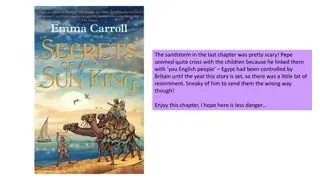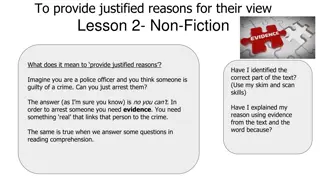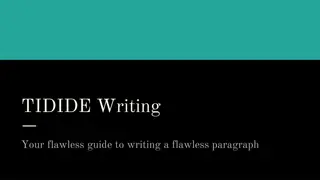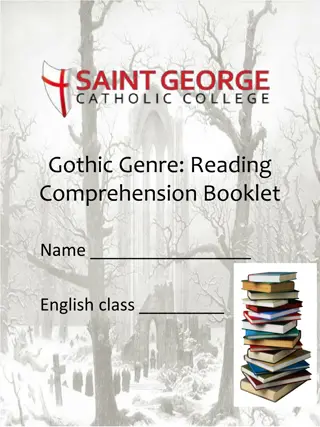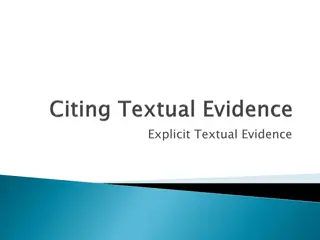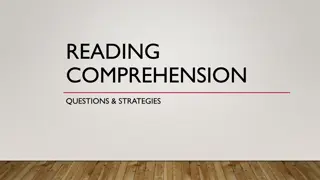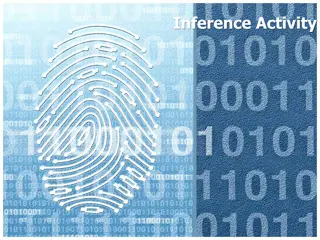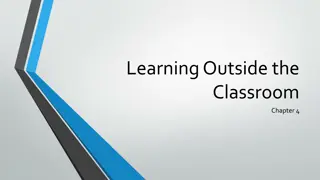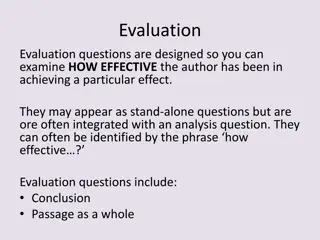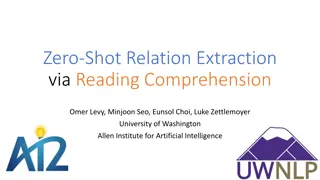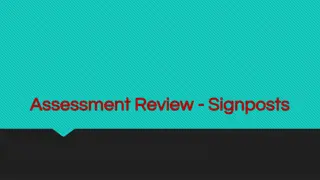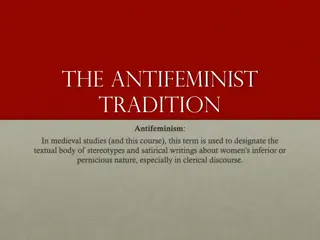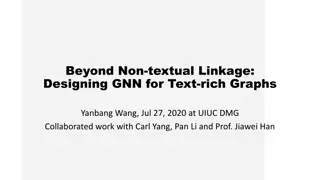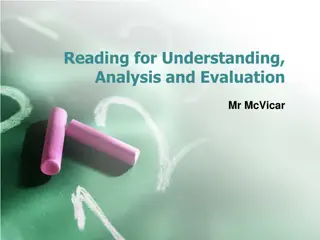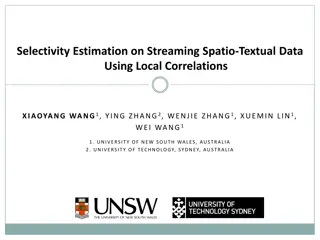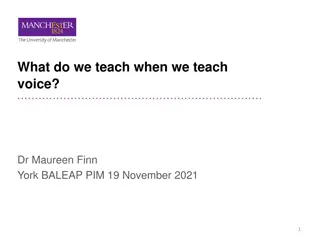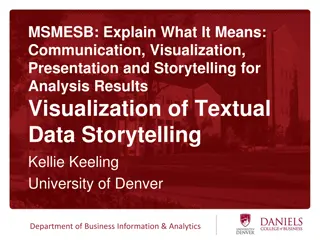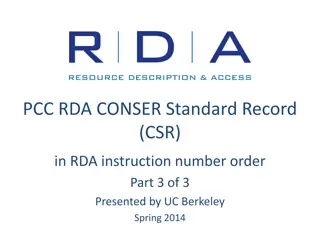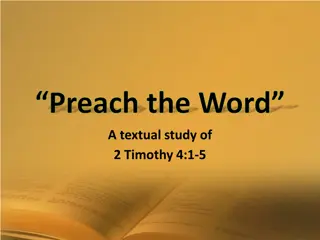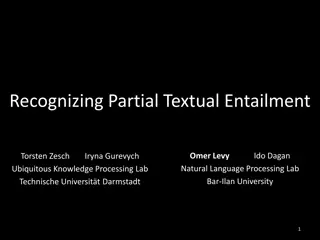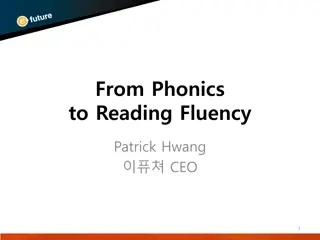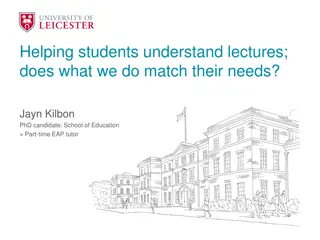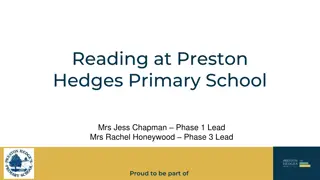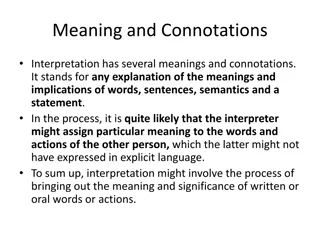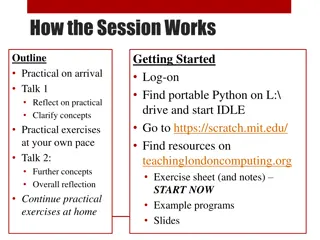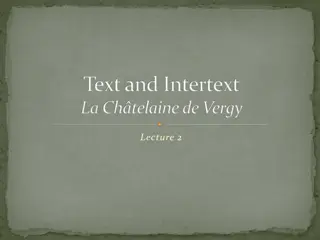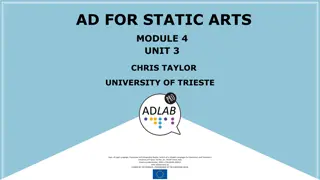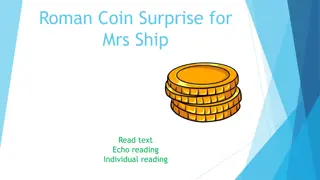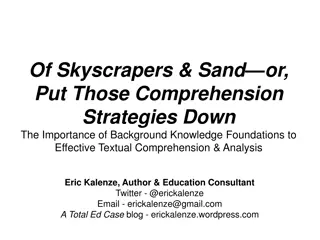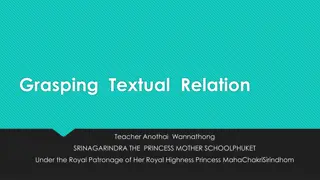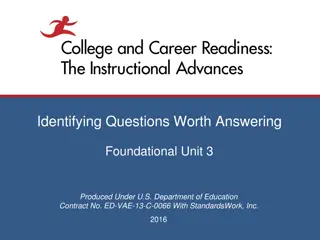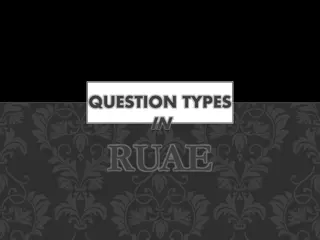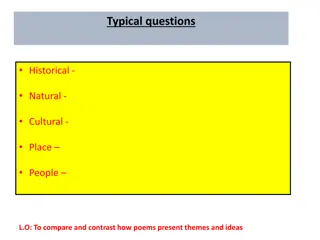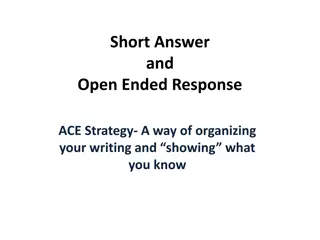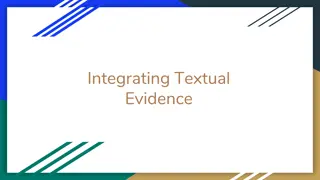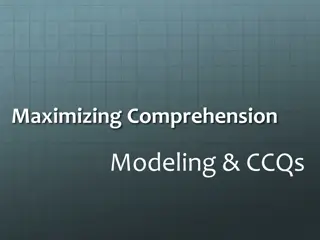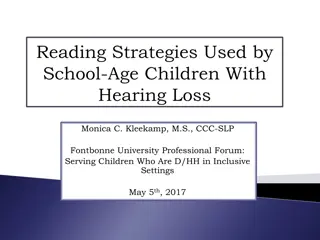Comprehension Questions for Chapter 17 - Test Your Understanding
Explore comprehension questions for Chapter 17 of the story, testing your understanding of key plot points and character insights. Dive into Lil's surprises, Tulip's challenges, and predictions about the mysterious torchlight. Analyze the changing dynamics in Egypt post-British control and unravel P
0 views • 10 slides
Providing Justified Reasons in Reading Comprehension
Providing justified reasons in reading comprehension involves using evidence from the text to support one's answer, similar to presenting evidence in a legal case. Just as a police officer needs evidence to make an arrest, readers need textual evidence and the word "because" to support their respons
0 views • 11 slides
Mastering Topic Sentences and Textual Evidence in Academic Writing
Learn how to craft effective topic sentences for your paragraphs, serving as mini-theses and providing a clear roadmap for your writing. Understand the importance of inference and textual evidence to support your ideas with relevant quotes and facts. Enhance your academic writing skills by mastering
0 views • 20 slides
Vocabulary Coverage and Reading Comprehension of University EFL Learners
University EFL learners' reading comprehension is closely linked to their vocabulary knowledge. A broad vocabulary positively impacts reading ability, with 98% vocabulary coverage facilitating successful reading without dictionary support. Indonesian high school graduates typically have a lower voca
0 views • 17 slides
Understanding the Gothic Genre Through Reading Comprehension Booklet
Dive into the mysterious world of the Gothic genre with a reading comprehension booklet featuring texts that will challenge your comprehension skills. Explore the eerie atmospheres, detailed descriptions, and captivating narratives that define this intriguing literary genre. Enhance your reading str
0 views • 15 slides
Mastering Explicit Textual Evidence in Reading Comprehension
Enhancing reading comprehension by utilizing explicit textual evidence to support ideas and opinions about the text. Learn how to clearly state ideas, specify text references, and comment on evidence to bolster your interpretations effectively.
0 views • 15 slides
Understanding Reading Comprehension: Questions and Strategies
Reading comprehension involves the ability to extract meaning from text through conscious processes before, during, and after reading. Good readers are adept at adjusting their reading based on the difficulty level of the text and utilizing strategies like activating background knowledge, monitoring
1 views • 37 slides
Reading Comprehension Inference Activities
Engage in reading comprehension with these inference activities. Analyze passages, make logical deductions, and answer questions to enhance critical thinking skills. Explore scenarios, draw conclusions, and strengthen your reading comprehension abilities through these interactive exercises.
2 views • 21 slides
Macbeth Act 3, Scene 4 Analysis
Explore deep into Macbeth Act 3, Scene 4 where the chilling encounter with Banquo's ghost shakes Macbeth to his core during a banquet. Dive into comprehension questions, textual analysis, and the unraveling of Macbeth's guilt through key quotations.
0 views • 16 slides
Effective Learning Strategies Outside the Classroom
Understanding and applying academic information through active reading strategies are fundamental in college learning. Seven essential learning methods include reading textual sources, solving problems, writing, case studies, individual projects, collaborative learning, and academic networking. Stru
0 views • 13 slides
Entity-based Memory Network for Text Comprehension
Entity-based Memory Network is a model designed for text comprehension, focusing on question-answering tasks in both open and closed domain QA. It incorporates features like distributed representation, feature modeling, and memory models at various levels to generate output features, predict answers
0 views • 17 slides
Analysis of Evaluation and Conclusion Questions in Textual Analysis
Evaluation and Conclusion questions play a crucial role in assessing the effectiveness of an author in achieving specific effects and summarizing key points in a passage. These types of questions are commonly found in textual analysis tasks to evaluate the success of conveying ideas and themes. Eval
0 views • 9 slides
Zero-Shot Relation Extraction via Reading Comprehension
In this study by Omer Levy, Minjoon Seo, Eunsol Choi, and Luke Zettlemoyer from the University of Washington and Allen Institute for Artificial Intelligence, a model is presented for zero-shot relation extraction via reading comprehension. The model can extract relations between entities without dir
0 views • 29 slides
Understanding Signpost Strategies for Deeper Reading Comprehension
Explore the concept of signposts in reading comprehension, focusing on how to identify key information in texts and develop effective responses to anchor questions. Dive into the significance of understanding textual elements and how they lead to deeper insights. Join in a Signpost Review Day to pra
0 views • 22 slides
Unveiling the Antifeminist Tradition: Ideological Roots, Textual Sources, and Female Nature
Explore the antifeminist tradition in medieval studies through a deep dive into its ideological roots, main textual sources, and portrayal of female nature. Discover how stereotypes and satirical writings about women's perceived inferiority have persisted throughout history, informed by clerical, in
0 views • 9 slides
Enhancing Graph Neural Networks for Text-rich Graphs
Designing GNNs for text-rich graphs involves considering both textual and non-textual linkage information among entities, such as papers, webpages, and people. Utilizing structural information beyond citation networks and exploring latent textual linkages are key challenges. Previous work has focuse
0 views • 33 slides
Enhancing Critical Reading Skills: Understanding, Analysis, and Evaluation in Literature
This content provides insights into developing critical reading skills, expanding knowledge of literary techniques, and preparing for assessments. It covers the concept of RUAE (Reading for Understanding, Analysis, and Evaluation), understanding questions, types of understanding questions, and tips
0 views • 119 slides
Selectivity Estimation on Streaming Spatio-Textual Data Using Local Correlations
This research focuses on efficient selectivity estimation on streaming spatio-textual data by incorporating local correlations. It addresses the challenge of estimating the number of objects in a query region with specific keywords in real-time. The study proposes novel approaches like ASP-tree and
0 views • 29 slides
Understanding Voice in Academic Writing: A Comprehensive Overview
Delve into the nuanced concept of voice in academic writing through a discussion of its definitions, classroom implications, evaluation aspects impacted by identities, and the importance of writer ownership. Explore the complex interplay of textual and non-textual elements shaping writer identity. C
0 views • 27 slides
Effective Communication and Visualization Techniques for Analyzing Textual Data
Enhance your data analysis skills with effective communication, visualization, presentation, and storytelling techniques. Discover how to analyze textual data through word/phrase frequencies, collocations, and clustering. Explore tools for text processing and natural language processing, such as Exc
0 views • 21 slides
Cataloging Rules and Processes for Textual Resources in RDA
Learning objectives and training provided by UC Berkeley in Spring 2014 on applying the CONSER Standard Record and RDA instructions to describe textual serials and integrating resources in various formats. The acronym review covers core elements and differences between AACR2 rules/AACR2 version of C
0 views • 44 slides
A Textual Study of 2 Timothy 4:1-5
In this textual study of 2 Timothy 4:1-5, the solemn charge of preaching the Word is emphasized, emphasizing the importance of proclaiming religious truths and principles to prepare for Jesus' return and eternity. The passage highlights the gravity and seriousness of preaching, urging preachers to f
1 views • 31 slides
Understanding Textual Entailment in Natural Language Processing
This collection of images showcases various aspects of textual entailment, where one text can entail another. It explores the relationship between statements like "muscles move bones" and "muscles generate movement". Different levels of entailment are depicted, culminating in complete textual entail
0 views • 72 slides
Understanding Essential Components of Reading Instruction
Explore the five crucial components of reading instruction outlined by the National Reading Panel and delve into the concepts of phonemic awareness, phonics, fluency, vocabulary, and text comprehension. Gain insights into the importance of incorporating these components in a structured manner to enh
0 views • 19 slides
Understanding L2 Lecture Comprehension: Student Perceptions and Research Insights
Exploring factors influencing L2 student comprehension of academic lectures, a PhD candidate delves into student perceptions compared with tutors and lecturer views. Through a longitudinal case study at a British university, data collection involves interviews and lecture observations to uncover key
0 views • 14 slides
Effective Reading Strategies at Preston Hedges Primary School
Utilizing a mix of phonics teaching, early reading techniques, automaticity, and fluency practices, Preston Hedges Primary School focuses on enhancing reading skills in young learners. Through a structured approach, including Essential Letters and Sounds, early comprehension development, and home su
0 views • 11 slides
Unveiling the Art of Interpretation: From Textual Meanings to Contextual Significance
Interpretation delves into the meanings and implications of words, sentences, and classical texts, bringing out their significance. It involves decoding complex ideas, separating temporal and perennial thoughts, and revealing contemporary relevance. Different approaches like textual and contextual a
0 views • 18 slides
Transitioning from Scratch to Python: A Practical Approach for Learning Textual Programming
Explore the transition from visual programming in Scratch to textual programming in Python using Turtle Graphics. Engage in practical exercises, clarify key concepts, and reflect on the challenges and progress in learning core programming concepts. Utilize resources from TeachingLondon Computing to
0 views • 21 slides
Exploring Intertextuality in Medieval Manuscripts
Delve into the concept of intertextuality in medieval manuscripts, focusing on the Châtelaine de Vergy. Discover how manuscript culture and mouvance shape textual mobility and authorship perceptions. Uncover key points on manuscript variations and the dynamic nature of medieval works. Critically ex
0 views • 16 slides
Linguistic and Textual Features of Ad in Static Arts
Explore the linguistic and textual features of advertising in static arts, focusing on the use of present tense, short declarative sentences, and vivid vocabulary. Understand how cohesion, repetition, and non-finite verbs contribute to the impact of museum advertisements compared to general ads.
0 views • 23 slides
Engaging Weekly Activities for Reading Comprehension in Mrs. Ship's Class
Explore a variety of interactive activities throughout the week in Mrs. Ship's class, including reading texts, vocabulary games, retrieval exercises, inference discussions, and comprehension questions. Students engage in tasks like identifying key features of a newspaper, playing vocabulary games, a
0 views • 7 slides
Importance of Background Knowledge for Effective Textual Comprehension
Understanding the significance of background knowledge in enhancing textual comprehension is crucial for education. The article emphasizes the misinterpretation of Bloom's Taxonomy and the need to recognize reading as more than just a skill. It highlights the importance of foundational knowledge in
0 views • 25 slides
Understanding Textual Relations in Language Teaching
Explore different types of textual relations such as lexical cohesion, grammatical cohesion, and more in language teaching. Learn how sentences are related through vocabulary, synonyms, general terms, and pronouns to enhance understanding and coherence in writing. Examples from the Grasping Textual
0 views • 23 slides
Enhancing Reading Comprehension Through Text-Dependent Questions
This resource delves into the significance of text-dependent questions in improving students' reading comprehension skills by emphasizing the importance of evidence from the text, building knowledge through nonfiction, and developing critical thinking abilities. It highlights key advances in educati
0 views • 16 slides
Understanding Different Types of Questions in Reading Comprehension
Explore various question types in reading comprehension such as understanding questions, own words questions, analysis questions, evaluation questions, and how to effectively handle each type. Images illustrate examples and explanations for better comprehension.
0 views • 17 slides
Exploring Poetry Analysis and Comparison Techniques
Dive into the realm of poetry analysis by comparing and contrasting how different poems present themes and ideas. Discover strategies for examining language, form, and structure used by poets to convey meanings and effects. Enhance your understanding of textual contexts and learn how to craft inform
0 views • 23 slides
Effective Writing with the ACE Strategy
Unlock the power of the ACE strategy to enhance your writing by answering questions with restated prompts, citing textual evidence, and providing detailed explanations. Understand the importance of textual evidence and learn how to structure your responses effectively to convey your understanding co
0 views • 16 slides
Mastering the Art of Integrating Textual Evidence
When incorporating textual evidence into your writing, it is crucial to use quotes strategically, ensuring they enhance your argument. By leading readers into and out of quotes seamlessly, and blending them into your sentences creatively, you can maintain the integrity and impact of the original tex
0 views • 8 slides
Enhancing Comprehension Through Effective Questioning Techniques
This instructional material focuses on maximizing comprehension through the implementation of Comprehension Check Questions (CCQs) in educational settings. The content covers the identification of CCQs, different types of CCQs, the importance of modeling and practicing CCQs in the classroom, and exa
0 views • 23 slides
Understanding Reading Abilities in Deaf/Hard of Hearing Children
Monica Kleekamp discusses the delayed reading abilities of children who are deaf/hard of hearing and explores the correlation between reading levels and phonological awareness. Different approaches to reading instruction and research questions on reading strategies, narrative comprehension, and impa
0 views • 21 slides
